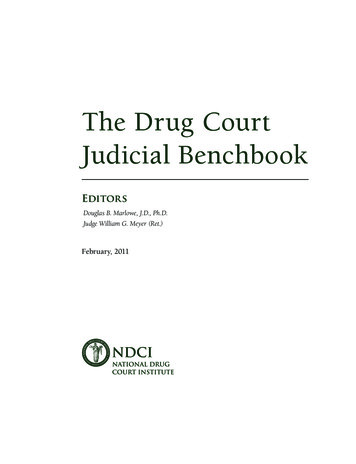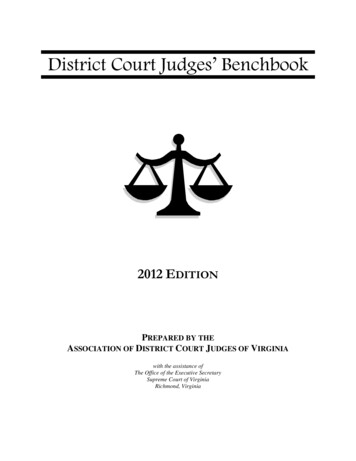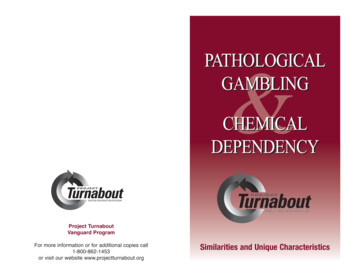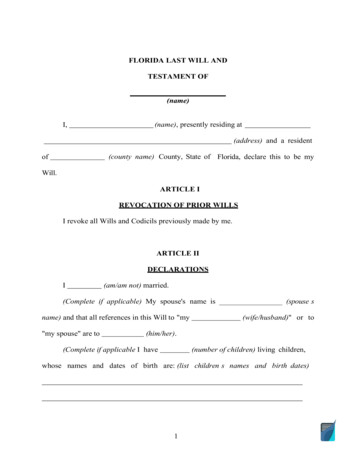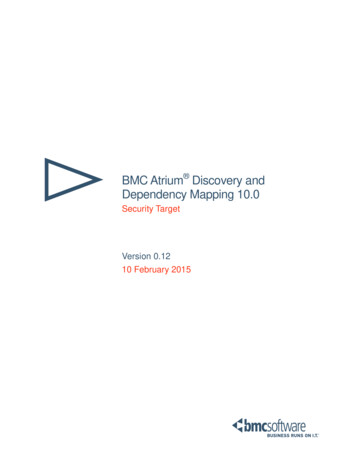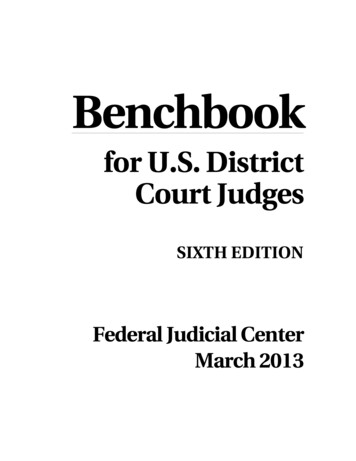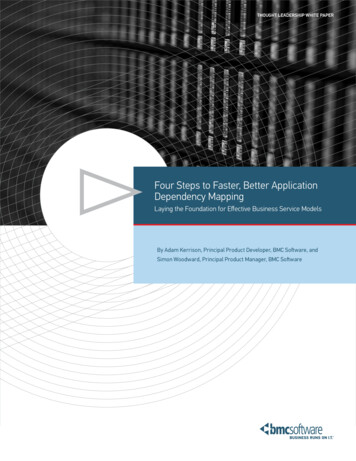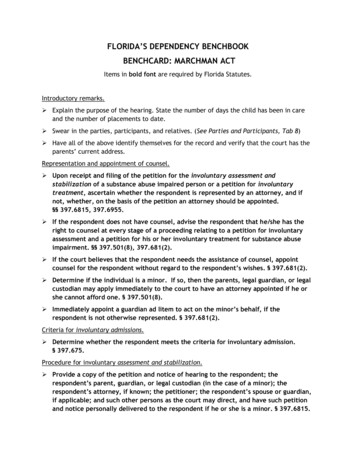
Transcription
FLORIDA’S DEPENDENCY BENCHBOOKBENCHCARD: MARCHMAN ACTItems in bold font are required by Florida Statutes.Introductory remarks. Explain the purpose of the hearing. State the number of days the child has been in careand the number of placements to date. Swear in the parties, participants, and relatives. (See Parties and Participants, Tab 8) Have all of the above identify themselves for the record and verify that the court has theparents’ current address.Representation and appointment of counsel. Upon receipt and filing of the petition for the involuntary assessment andstabilization of a substance abuse impaired person or a petition for involuntarytreatment, ascertain whether the respondent is represented by an attorney, and ifnot, whether, on the basis of the petition an attorney should be appointed.§§ 397.6815, 397.6955. If the respondent does not have counsel, advise the respondent that he/she has theright to counsel at every stage of a proceeding relating to a petition for involuntaryassessment and a petition for his or her involuntary treatment for substance abuseimpairment. §§ 397.501(8), 397.681(2). If the court believes that the respondent needs the assistance of counsel, appointcounsel for the respondent without regard to the respondent’s wishes. § 397.681(2). Determine if the individual is a minor. If so, then the parents, legal guardian, or legalcustodian may apply immediately to the court to have an attorney appointed if he orshe cannot afford one. § 397.501(8). Immediately appoint a guardian ad litem to act on the minor’s behalf, if therespondent is not otherwise represented. § 397.681(2).Criteria for involuntary admissions. Determine whether the respondent meets the criteria for involuntary admission.§ 397.675.Procedure for involuntary assessment and stabilization. Provide a copy of the petition and notice of hearing to the respondent; therespondent’s parent, guardian, or legal custodian (in the case of a minor); therespondent’s attorney, if known; the petitioner; the respondent’s spouse or guardian,if applicable; and such other persons as the court may direct, and have such petitionand notice personally delivered to the respondent if he or she is a minor. § 397.6815.
Issue a summons to the person whose admission is sought and conduct a hearing within10 days; § 397.6815(1); OR If the respondent is without the appointment of an attorney and the court relies solelyon the contents of the petition, enter an ex parte order authorizing the involuntaryassessment and stabilization of the respondent. § 397.6815(2). If necessary, order a law enforcement officer or other designated agent of the court totake the respondent into custody and deliver him or her to the nearest appropriatelicensed service provider. § 397.6815(2).Hearing on petition for involuntary assessment and stabilization. Hear all relevant testimony. § 397.6818. The respondent must be present unless the court has reason to believe that therespondent’s presence is likely to be injurious to him or her, in which case appoint aguardian advocate to represent the respondent. § 397.6818. Afford the respondent the right to examination by a court-appointed qualifiedprofessional. § 397.6818. After hearing all the evidence, determine whether there is a reasonable basis tobelieve the respondent meets the criteria for involuntary admissions. § 397.6818.Court order for involuntary assessment and stabilization. Based on the determination above, either dismiss the petition or immediately enter anorder authorizing the involuntary assessment and stabilization of the respondent; ORif in the course of the hearing, the respondent, due to mental illness other than or inaddition to substance abuse impairment, is likely to injure himself or herself oranother if allowed to remain at liberty, initiate involuntary proceedings under theprovisions of Part I of Chapter 394. § 397.6818(1). If the court enters an order authorizing involuntary assessment and stabilization, theorder shall include findings with respect to the availability and appropriateness of theleast restrictive alternatives and the need for the appointment of an attorney torepresent the respondent, and may designate the specific licensed service provider toperform the involuntary assessment and stabilization of the respondent. Therespondent may choose the licensed service provider to deliver the involuntaryassessment where possible and appropriate. § 397.6818(2). If necessary, order the sheriff to take the respondent into custody and deliver him orher to the licensed service provider specified in the court order or, if none isspecified, to the nearest appropriate licensed service provider for involuntaryassessment. § 397.6818(3).Procedure for involuntary treatment.
Upon the filing of a petition for the involuntary treatment, immediately determinewhether the respondent is represented by an attorney or whether the appointment ofcounsel for the respondent is appropriate. § 397.6955. Hold a hearing on the petition within 10 days. § 397.6955. Make sure that a copy of the petition and notice of the hearing were provided to therespondent; the respondent’s parent, guardian, or legal custodian; the respondent’sattorney, if known; the petitioner; the respondent’s spouse or guardian, if applicable;and such other persons as the court may have directed, and that such petition andorder were personally delivered to the respondent, if he or she is a minor.§ 397.6955. Issue a summons to the person whose admission is sought. § 397.6955.Hearing on petition for involuntary treatment. Hear and review all relevant evidence, including the review of results of theassessment completed by the qualified professional in connections with therespondent’s protective custody, emergency admission, involuntary assessment, oralternative involuntary admission. § 397.6957(1). Ensure that the respondent is present. If the court finds that the respondent’spresence is likely to be injurious to himself or herself or others, appoint a guardianadvocate to act in behalf of the respondent throughout the proceedings.§ 397.6957(1). The petitioner has the burden of proof by clear and convincing evidence.§ 397.6957(2). At the conclusion of the hearing, either dismiss the petition or order the respondentto undergo involuntary substance abuse treatment, with the respondent’s chosenlicensed service provider to deliver the involuntary substance abuse treatment wherepossible and appropriate. § 397.6957(3).Effect of court order for involuntary treatment. If the conditions for involuntary substance abuse treatment have been proved by clearand convincing evidence, consider ordering the respondent to undergo involuntarytreatment by a licensed service provider for a period not to exceed 60 days.§ 397.697(1). If necessary, direct the sheriff to take the respondent into custody and deliver him orher to the licensed service provider specified in the court order, or to the nearestappropriate licensed service provider for involuntary treatment. § 397.697(1). If the conditions justifying involuntary treatment are expected to exist after 60 daysof treatment, a renewal of the involuntary treatment order may be requestedpursuant to § 397.6975 prior to the end of the 60-day period. § 397.697(1).
In all cases resulting in an order for involuntary substance abuse treatment, retainjurisdiction over the case and the parties for the entry of such further orders as thecircumstances may require. § 397.697(2). The court’s requirements for notification of proposed release must be included in theoriginal treatment order. § 397.697(2). An involuntary treatment order authorizes the licensed service provider to require theindividual to undergo such treatment as will benefit him or her, including treatment atany licensable service component of a licensed service provider. § 397.697(3).Procedure for extension of involuntary treatment period. Immediately schedule a hearing to be held not more than 15 days after filing of apetition for renewal of the involuntary treatment order. § 397.6975(1). Provide the copy of the petition for renewal and the notice of the hearing to allparties to the proceeding. § 397.6975(1).Hearing on extension of involuntary treatment period. Conduct the hearing pursuant to § 397.6957; (see Hearing on Petition for InvoluntaryTreatment above). § 397.6975(1).Court order on extension of involuntary treatment period. If the petition for renewal of the involuntary treatment order should be granted, orderthe respondent to undergo involuntary treatment for a period not to exceed anadditional 90 days. § 397.6975(2). If the conditions justifying involuntary treatment no longer exist, the individual mustbe released as provided in § 397.6971. § 397.6975(2).Complete a written order.
MARCHMAN ACT SUPPLEMENTGenerally. Representation and appointment of counsel.What should I do after swearing in the parties? The court should inform the respondentthat he or she has the right to be represented by counsel in any involuntary proceeding forassessment, stabilization, or treatment. § 397.501(8).What may I do if the individual is a minor? If the individual is a minor, then the parents,legal guardian, or legal custodian may apply immediately to the court to have an attorneyappointed if he or she cannot afford one. § 397.501(8). Also, immediately appoint aguardian ad litem to act on the minor’s behalf, if the respondent is not otherwiserepresented. § 397.681(2).What if the respondent does not want counsel? The court may appoint counsel for therespondent without regard to the respondent’s wishes, if the court believes that therespondent needs the assistance of counsel. § 397.681(2).What if the respondent is unable to afford counsel? A respondent who desires counsel andis unable to afford private counsel has the right to court-appointed counsel and to thebenefits of section 57.081, Florida Statutes. § 397.681(2). Criteria for involuntary admission.How do I know if an individual meets the criteria for involuntary admission? An individualmeets the criteria if there is a good faith reason to believe the individual is substanceabuse impaired and, because of such impairment: Has lost the power of self-control with respect to substance use; and eitheroHas inflicted, or threatened or attempted to inflict, or unless admitted is likely toinflict, physical harm on himself or herself or another; ORoIs in need of substance abuse services and, by reason of substance abuseimpairment, his or her judgment has been so impaired that the person is incapableof appreciating his or her need for such services and of making a rational decisionin regard thereto; however, mere refusal to receive such services does notconstitute evidence of lack of judgment with respect to his or her need for suchservices. § 397.675. Habeas Corpus.
Can a person being involuntarily retained petition for a writ of habeas corpus? At anytime, and without notice, an individual involuntarily retained by a provider, or theindividual’s parent, guardian, custodian, or attorney on behalf of the individual, maypetition for a writ of habeas corpus to question the cause and legality of such retentionand request that the court issue a writ for the individual’s release. § 397.501(9). Petition for involuntary assessment and stabilization.What should be in a petition for involuntary assessment and stabilization? A petition mustcontain the name of the respondent; name of the applicant(s); the relationship betweenthe respondent and the applicant; the name of the respondent’s attorney, if known, and astatement of the respondent’s ability to afford an attorney; and must state facts tosupport the need for involuntary assessment and stabilization, including: The reason for the petitioner’s belief that the respondent is substance abuseimpaired; and The reason for the petitioner’s belief that because of such impairment the respondenthas lost the power of self-control with respect to substance abuse; and eitheroThe reason the petitioner believes that the respondent has inflicted or is likely toinflict physical harm on himself or herself or others unless admitted; ORoThe reason the petitioner believes that the respondent’s refusal to voluntarilyreceive care is based on judgment so impaired by reason of substance abuse thatthe respondent is incapable of appreciating his or her need for care and of makinga rational decision regarding that need for care. If the respondent has refused tosubmit to an assessment, such refusal must be alleged in the petition. § 397.6814. Admission-involuntary assessment and stabilization.How long can the respondent be admitted for involuntary assessment and stabilization? Ifthe respondent meets the criteria for involuntary admission under § 397.675, he or shemay be admitted for a period of five days to a hospital or to a licensed detoxificationfacility or additions receiving facility, for involuntary assessment and stabilization or to aless restrictive component of a licensed service provider for assessment only upon entry ofa court order or upon receipt by the licensed service provider of a petition. § 397.6811.Who may file a petition if the respondent is a minor? If the person upon whose behalf thepetition is being filed is a minor, a petition for involuntary assessment and stabilizationmay be filed by a parent, legal guardian, legal custodian, or licensed service provider. §397.6811(2).What is the responsibility of the licensed service provider? A licensed service provider mayadmit an individual for involuntary assessment and stabilization for a period not to exceedfive days. The individual must be assessed without unnecessary delay by a qualifiedprofessional. If an assessment is performed by a qualified professional who is not a
physician, the assessment must be reviewed by a physician before the end of theassessment period. § 397.6819.If an assessment cannot be completed in five days, can the time be extended? Yes. If alicensed service provider is unable to complete the involuntary assessment and, ifnecessary, stabilization of an individual within five days after the court’s order, it may,within the original time period, file a written request for an extension of time tocomplete its assessment, and shall in accordance with confidentiality requirements,furnish a copy to all parties. § 397.6821.Is a hearing required to extend the time for the assessment? No. With or without ahearing, the court may grant additional time, not to exceed 7 days after the date of therenewal order, for the completion of the involuntary assessment and stabilization of theindividual. § 397.6821.The original court order authorizing the involuntary assessment andstabilization, or a request for an extension of time to complete the assessment andstabilization that is timely filed, constitutes legal authority to involuntarily hold theindividual for a period of not to exceed 10 days in the absence of a court order to thecontrary. § 397.6821. Involuntary treatment.Who may file a petition if the respondent is a minor? If the respondent is a minor, apetition for involuntary treatment may be filed by a parent by a parent, legal guardian, orservice provider. § 397.695.What should be in a petition for involuntary treatment? A petition must contain the nameof the respondent to be admitted; name of the petitioner(s); the relationship between therespondent and the petitioner; the name of the respondent’s attorney, if known, and astatement of the petitioner’s knowledge of the respondent’s ability to afford an attorney;the findings and recommendations of the assessment performed by the qualifiedprofessional; and the factual allegations presented by the petitioner establishing the needfor involuntary treatment, including: The reason for the petitioner’s belief that the respondent is substance abuseimpaired; and The reason for the petitioner’s belief that because of such impairment the respondenthas lost the power of self-control with respect to substance abuse; and eitheroThe reason the petitioner believes that the respondent has inflicted or is likely toinflict physical harm on himself or herself or others unless admitted; ORoThe reason the petitioner believes that the respondent’s refusal to voluntarilyreceive care is based on judgment so impaired by reason of substance abuse thatthe respondent is incapable of appreciating his or her need for care and of makinga rational decision regarding that need for care. § 397.6951What is the burden of proof in a hearing on a petition for involuntary treatment? Thepetitioner has the burden of proof by clear and convincing evidence. § 397.6957(2).
What must be proven by clear and convincing evidence at a hearing on a petition forinvoluntary treatment? The petitioner must prove: The respondent is substance abuse impaired; AND Because of such impairment the respondent has lost the power of self-control withrespect to substance abuse; and eitheroThe respondent has inflicted or is likely to inflict physical harm on himself orherself or others unless admitted; ORoThe respondent’s refusal to voluntarily receive care is based on judgment soimpaired by reason of substance abuse that the respondent is incapable ofappreciating his or her need for care and of making a rational decision regardingthat need for care. § 397.6957(2).What happens at the conclusion of the hearing for involuntary treatment? Either dismissthe petition or order the respondent to undergo involuntary substance abuse treatment,with the respondent’s chosen licensed service provider to deliver the involuntarysubstance abuse treatment where possible and appropriate. § 397.6957(3).When may a person be the subject of a petition for court-ordered involuntary treatment?A person may be the subject of a petition for court-ordered involuntary treatment, if thatperson meets the criteria for involuntary admission provided in § 397.675 and: Has been placed under protective custody pursuant to § 397.677 within the previous 10days; Has been subject to an emergency admission pursuant to § 397.679 within the previous10 days; Has been assessed by a qualified professional within 5 days; Has been subject to involuntary assessment and stabilization pursuant to § 3979.6818within the previous 12 days; OR Has been subject to alternative involuntary admission pursuant to § 397.6822 withinthe previous 12 days. § 397.693. Early release from involuntary treatment.Is early release from involuntary substance abuse treatment possible? Yes. At any timeprior to the end of the 60-day involuntary treatment period, or prior to the end of anyextension granted pursuant to § 397.6975, an individual admitted for involuntarytreatment may be determined eligible for discharge to the most appropriate referral ordisposition for the individual when: The individual no longer meets the criteria for involuntary admission and has given hisor her informed consent to be transferred to voluntary treatment status;
If the individual was admitted on the grounds of likelihood of infliction of physicalharm upon himself or herself or others, such likelihood no longer exists; or If the individual was admitted on the grounds of need for assessment and stabilizationor treatment, accompanied by inability to make a determination respective such need,EITHERoSuch inability no longer exists; ORoIt is evident that further treatment will not bring about further significantimprovements in the individual’s condition; The individual is no longer in need of services; or The director of the service provider determines that the individual is beyond the safemanagement capabilities of the provider. § 397.6971(1).What happens when an individual is ready for early release? Whenever a qualifiedprofessional determines that an individual admitted for involuntary treatment is ready forearly release for any of the reasons listed in § 397.6971(1), the service provider shallimmediately discharge the individual, and must notify all persons specified by the court inthe original treatment order. § 397.6971(2). Extension of involuntary treatment period.Can the involuntary substance abuse treatment period be extended? Yes. Whenever aservice provider believes that an individual who is nearing the scheduled date of releasefrom involuntary treatment continues to meet the criteria for involuntary treatment in §397.693, a petition for renewal of the involuntary treatment order may be filed with thecourt at least 10 days before the expiration of the court-ordered treatment period. §397.6975(1).When does the court hear a petition for renewal? The must immediately set a hearing tobe held not more than 15 days after filing of the petition. The court must provide a copyof the petition and notice of hearing to all parties to the proceeding. The hearing isconducted pursuant to § 397.6957. § 397.6975(1).What happens if the court grants the petition for renewal? If the petition for renewal ofthe involuntary treatment order should be granted, the court may order the respondent toundergo involuntary treatment for a period not to exceed an additional 90 days. §397.6975(2).What if the conditions justifying involuntary treatment no longer exist? When theconditions justifying involuntary treatment no longer exist, the individual must bereleased as provided in § 397.6971. § 397.6975(2).What if the conditions justifying involuntary treatment continue to exist after 90 days ofadditional treatment? When the conditions justifying involuntary treatment continue toexist after 90 days of additional treatment, a new petition requesting renewal of theinvoluntary treatment order may be filed. § 397.6975(2).
Disposition of individual upon completion of involuntary treatment.What happens at the end of the 60-day period of court-ordered involuntary treatment? Atthe conclusion of the 60-day period of court-ordered involuntary treatment, the individualis automatically discharged unless a motion for renewal of the involuntary treatmentorder has been filed with the court pursuant to § 397.6975. § 397.6977.How does the 60 day period operate? In denying a petition for a writ of habeas corpus, theFourth District Court of Appeal has held that the “automatic discharge [is] at the‘conclusion of the 60-day period of court-ordered involuntary treatment,’ not merely sixtydays after the entry of the order for treatment.” S.M.F. v. Needle, 757 So. 2d 1265 (Fla.4th DCA 2000)(quoting section 397.6977)(denying writ of habeas corpus because thepetitioning juvenile ran away before commencing treatment). Confidentiality of records.What records are confidential? The records of service providers which pertain to theidentity, diagnosis, and prognosis of and service provision to any individual areconfidential in accordance with Chapter 397 and with applicable federal confidentialityregulations and are exempt from § 119.07(1) and § 24(a), Article I of the FloridaConstitution. Such records may not be disclosed without the written consent of theindividual to whom they pertain except that appropriate disclosure may be made withoutsuch consent as provided in § 397.501(7)(a), including upon court order based onapplication showing good cause for disclosure. § 397.501(7)(a).How do I determine good cause for disclosure of confidential records? In determiningwhether there is good cause for disclosure, examine whether the public interest and theneed for disclosure outweigh the potential injury to the individual, to the service providerand the individual, and to the service provider itself. § 397.501(7)(a)5.Are there special characteristics of the order? Yes. An order authorizing disclosure and useof confidential information is a unique kind of court order. Its only purpose is to authorizea disclosure or use of identifying information which would otherwise be prohibited. Suchan order does not compel disclosure. A subpoena or a similar legal mandate must beissued in order to compel disclosure. This mandate may be entered at the same time as,and accompany, an authorizing court order. § 397.501(7)(f).Who may seek disclosure of records? An order authorizing the disclosure of an individual’srecords may be applied for by any person having a legally recognized interest in thedisclosure which is sought. The application may be filed separately or as part of a pendingcivil action in which it appears that the individual’s records are needed to provideevidence. An application must use a fictitious name, such as John Doe or Jane Doe, torefer to any individual and may not contain or otherwise disclose any identifyinginformation unless the individual is the applicant or has given a written consent todisclosure or the court has ordered the record of the proceeding sealed from publicscrutiny. § 397.501(g).
Are there any special notice requirements? Yes. The individual and the person holding therecords from whom disclosure is sought must be given adequate notice in a manner whichwill not disclose identifying information to other persons, and an opportunity to file awritten response to the application, or to appear in person, for the limited purpose ofproviding evidence on the statutory and regulatory criteria for the issuance of the courtorder. § 397.501(h).Is the hearing held in open court? Not by default. Any oral argument, review of evidence,or hearing on the application must be held in the judge’s chambers or in some mannerwhich ensures that identifying information is not disclosed to anyone other than a party tothe proceeding, the individual, or the person holding the record, unless the individualrequests an open hearing. The proceeding may include an examination by the judge of therecords referred to in the application. § 397.501(7)(i).Can the court authorize disclosure of records for a criminal investigation or prosecution? Acourt may authorize the disclosure and use of records for the purpose of conducting acriminal investigation or prosecution of an individual only if the court finds that all of thefollowing criteria are met: The crime involved is extremely serious, such as one which cases or directly threatensloss of life or serious bodily injury, including but not limited to homicide, sexualassault, sexual battery, kidnapping, armed robbery, assault with a deadly weapon, andchild abuse and neglect. There is reasonable likelihood that the records will disclose information of substantialvalue in the investigation or prosecution. Other ways of obtaining the information are not available or would not be effective.The potential injury to the individual, to the physician-individual relationship, and to theability of the program to provide services to other individuals is outweighed by the publicinterest and the need for the disclosure. § 397.501(7)(j).
BENCHCARD:99981231160000-0800MARCHMAN ACT Items in bold font are required by Florida Statutes. Introductory remarks. Explain the purpose of the hearing. State the number of days the child has been in care and the number of placements to date. Swear in the parties, participants, and relatives. (See Parties and Participants, Tab 8)

